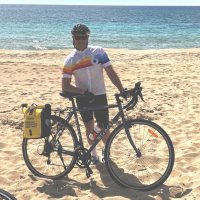What is the best grease for pedal threads & seat posts?
Plundertaker
Posts: 12
I have recently purchased a new set of Shimano Ultegra 6800 pedals to put on my new bike & was looking for some advice in selecting a good quality grease to apply to the threads before fitting them? The Finish Line anti-seize grease seems to be a popular choice but was wondering what others are using?
The bike also has an aluminium frame and a carbon seat post, would some carbon assembly paste be the best product to apply here in order to avoid the seat post slipping or becoming jammed in future?
The bike also has an aluminium frame and a carbon seat post, would some carbon assembly paste be the best product to apply here in order to avoid the seat post slipping or becoming jammed in future?
0
Comments
-
I just use this on most everything: http://www.chainreactioncycles.com/weld ... p-prod59580
-
Yes anti-seize on the pedal/crank threads and carbon grip paste for the carbon seat post in an alloy frame, and remember to perform the keff66 recommended maintenance tip of removing the seat post every couple of months or so, for a clean and reapplication, to prevent it becoming stuck in the seat tube permanently.0
-
DJ58 wrote:. . . carbon grip paste for the carbon seat post in an alloy frame . . .
Is this the best approach for alloy post in carbon frame too?Wilier Izoard XP0 -
yes
aluminium is vulnerable to galvanic corrosion with cf, (it's less noble than carbon so the al will lose the battle), the corrosion product occupies more volume and will eventually jam the post, using cf assembly paste will greatly reduce the risk
if it's only ridden dry or with effective mudguards it'll last a long time, but water from wet rides without guards will gradually seep in and displace it, depends on how many wet rides there are
my frame is steel and post is cf, no corrosion issue but i redo every 4-6 months as that's about how long it lasts with the amount of wet rides, otherwise it can start clicking/creakingmy bike - faster than god's and twice as shiny0 -
sungod wrote:yes
aluminium is vulnerable to galvanic corrosion with cf, (it's less noble than carbon so the al will lose the battle), the corrosion product occupies more volume and will eventually jam the post, using cf assembly paste will greatly reduce the risk
if it's only ridden dry or with effective mudguards it'll last a long time, but water from wet rides without guards will gradually seep in and displace it, depends on how many wet rides there are
my frame is steel and post is cf, no corrosion issue but i redo every 4-6 months as that's about how long it lasts with the amount of wet rides, otherwise it can start clicking/creaking
Thanks - time to buy C paste!Wilier Izoard XP0 -
Don't use copperslip. It seems to react badly with aluminium.0
-
witstu wrote:Don't use copperslip. It seems to react badly with aluminium.
Don't know about that - I've used copperslip for years and it's been fine. Generally I use copperslip for anything with threads, carbon paste for anything involving carbon parts (inc. carbon post in a steel frame), Motorex Bike Grease 2000 for "static" parts (stems etc) and Phil Wood Tenacious Oil for everything else (brakes, derailleurs etc).0 -
the anodic index of copper is far enough from that of aluminium for galvanic corrosion to occur, cu-al is almost as bad as ti-al in this respect, but on threaded parts the carrier grease isn't readily flushed out so it's not likely to be an issue
if it's an area where water is likely to get in, a zn loaded antiseize is better, zn is less noble than al and will be the sacrificial elementmy bike - faster than god's and twice as shiny0 -
sungod wrote:but on threaded parts the carrier grease isn't readily flushed out so it's not likely to be an issue
Excuse my ignorance, but is that because the grease isn't acting as an electrolyte so no corrosion occurs, or is it that corrosion occurs but only in small 'quantities' as the reagents (if that makes sense) aren't being renewed? I tried to Wikipedia it but inevitably got lost.0



